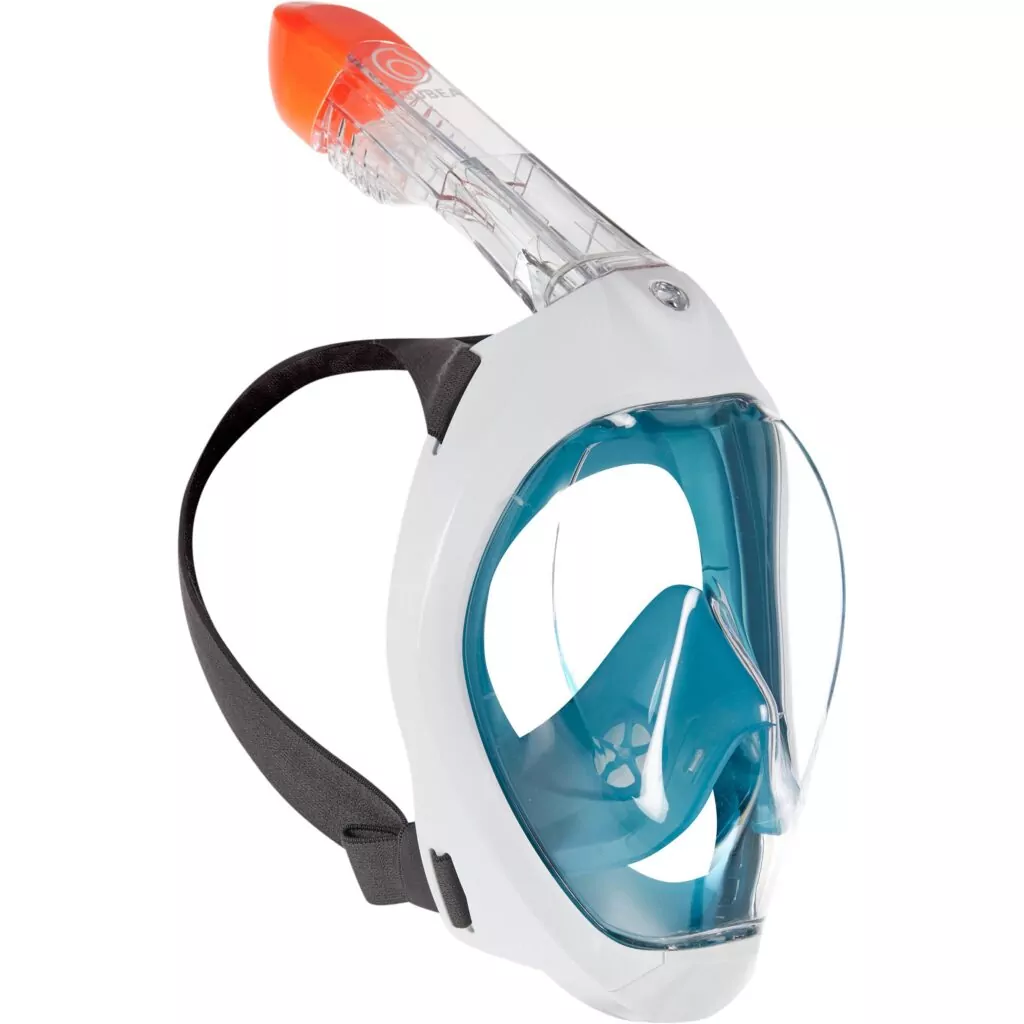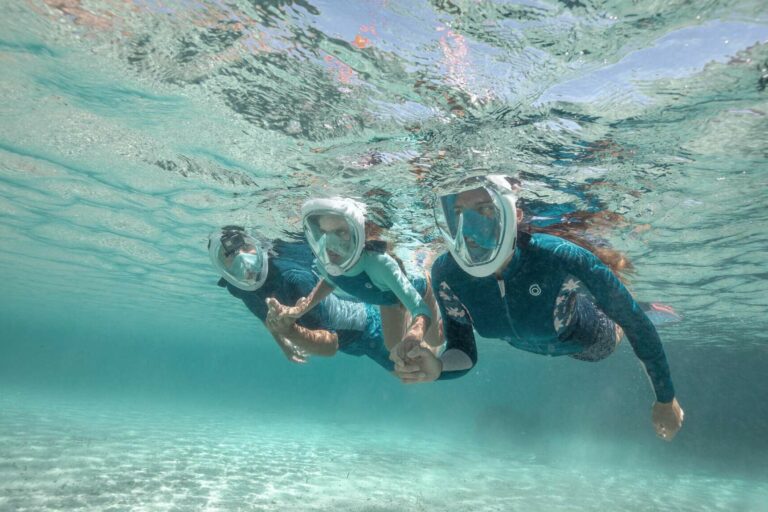A UK coroner has issued a public warning about what she says are the risks posed to snorkellers with underlying health conditions who use full-face masks.
The concerns of Surrey assistant coroner Caroline Topping follow her verdict at an inquest into the death of 63-year-old Angela Kearn. The experienced snorkeller had found herself in difficulties off Hurghada in the Egyptian Red Sea in January 2020. Brought back to the beach she had collapsed and died later in hospital, with the cause of death attributed to immersion pulmonary oedema (IPO).
Kearn had been snorkelling with a Decathlon Easybreath mask, some 16 million of which have been sold to date. She had been using the product for five years before her death but had recently been diagnosed with hypertension, and was also using hormone replacement therapy (HRT) for menopausal symptoms.
At the inquest, which closed in December 2022, Topping concluded that these medical factors had combined with Kearn’s use of the full-face mask in contributing to her death.
She has now submitted a “prevention of future deaths” report to the General Medical Council, National Trading Standards, Royal Society for the Prevention of Accidents and Decathlon UK, expressing concern that snorkellers with ongoing cardiovascular and respiratory issues are given insufficient warning that full-face masks could be dangerous for them to use.
The coroner has requested the four parties to respond with a timetable for action by 9 May.
Cause of death
“Expert evidence at the inquest identified IPO as the cause of the death,” says Topping in her report. “This is caused by the build-up of fluid in the lungs as a result of an increase in pulmonary capillary pressure caused by water pressure when the chest is submerged.
“This is exacerbated by hypertension and HRT. Negative pressure in the lungs causes fluid from the blood vessels to be drawn into the lungs.”
Topping says that the full-face snorkel mask had contributed to Kearn’s death because negative pressure in the lungs rises as a result of the increased effort of breathing through a snorkel tube and mask and also because respiratory effort is increased by inhaling elevated CO2 levels as air is drawn through “dead space” in the mask.
“Both exacerbate the negative pressure in the lungs and increase the effects of IPO,” concludes Topping.
Since mid-2015 the Decathlon Easybreath mask had carried a small-print warning that users should be in good physical condition and that the mask was not suitable for swimming. Since 2017 it had carried a more specific warning but, according to Topping, safety concerns had “not been widely publicised or brought to the attention of those who already own the masks”. Warnings were neither prominent nor sufficient to alert potential buyers to the risk.

She said that medical witnesses at the inquest had raised concerns that “there is very little awareness of IPO in the medical profession and that it is not addressed in medical training. As a consequence, it can be missed by those treating the condition and is often mistaken for drowning.”
No UK or European standards had been in place when the Easybreath mask was launched, and Decathlon had agreed that its testing failed to replicate real-life snorkelling conditions.
A medical investigation had been conducted at Topping’s request to determine whether breathing through the mask led to excessive CO2 inhalation, leading the experts to “strongly recommend“ that anyone with underlying cardio-respiratory conditions be advised not to use the Easybreath.
Risk warning
The mask now carries a risk warning aimed at such users, with advice that it should be used only for mild-to-moderate exercise and not for active swimming.
The Decathlon website warns anyone with ongoing respiratory or cardiovascular issues “including but not limited to chest infection, asthma, high / raised blood pressure (hypertension), heart disease or angina etc” against using the product, and suggests consulting a medical practitioner if in doubt.
In August 2020 Divernet reported that dive operators had been asked by Egypt’s Chamber of Diving & Water Sports to discourage Red Sea snorkellers from using full-face snorkel masks. The CDWS had attributed several incidents it had investigated to “the risk of inhaling the accumulated CO2 inside of the mask produced while breathing”.
Most weeks bring new reports of often-unexplained snorkelling fatalities around the world. Past reports on Divernet on research in Hawaii, where such deaths among tourists have become a significant issue, have suggested that IPO is responsible for the majority of incidents.
Crucially, however, Hawaii’s Snorkel Safety Study found no evidence that full-face masks were any more to blame for these incidents than standard snorkels, concluding that any design that caused undue constriction of the airways could result in an IPO in certain circumstances.
The Hawaii research is summarised on Divernet in Red Flags For Snorkellers: How To Stop The Quiet Deaths and The Hawaiian Snorkelling Deaths Mystery.
TUI settles with UK snorkeller’s widow
Sue Fawcett, whose husband Roy drowned while snorkelling off Paradise Island in the Dominican Republic in October 2017, has received an undisclosed six-figure out-of-court settlement. Her £560,000 legal action against tour operator TUI had been due to be heard in the High Court.
Roy Fawcett, a 58-year-old project manager from Swindon, had booked an “advanced snorkelling” lesson and had been in the sea with what was supposed to be a supervised group of 10, but after going missing he had been found face-down and immobile. There had been difficulties in getting him to the hospital, where he was later declared dead.
His widow claimed that the couple had been under the impression that the excursion was provided by TUI when it was booked, but the tour operator had denied that it was part of its holiday package.
An inquest in September 2018 found that Fawcett had died from accidental drowning on a “poorly monitored” holiday excursion. The coroner said that when he was found the organisers “did not really know what to do”.
“Before signing up to anything I’d urge all holidaymakers to make sure they know who’s organising any trips and what safety measures are in place,” said Fawcett’s widow. “I can’t turn the clock back, but by speaking out I just hope that I can raise awareness of what we’ve been through to potentially help others.”
Also on Divernet: Snorkelling Masks To The Rescue

